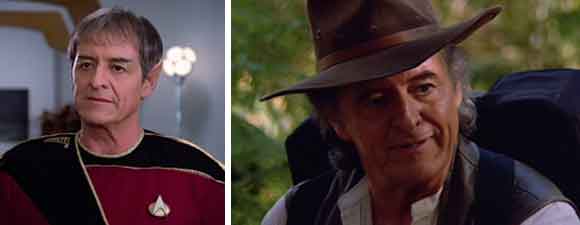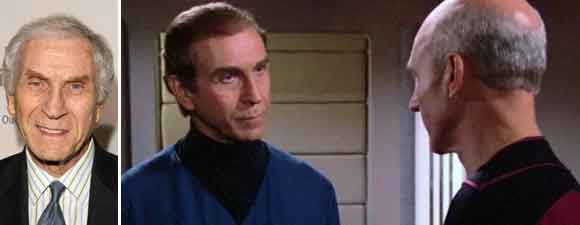Retro Review: Ethics
7 min readWhen an accident leaves Worf paralyzed, he asks Riker to help him commit ritual suicide so that he will not become a dishonored burden on his family and friends.
Plot Summary: A flawed container falls in a cargo bay, crushing Worf’s spine. In sickbay, he asks Crusher to remove the stasis field holding him down, only to be told that there is no stasis field — he has been paralyzed. Crusher brings aboard a neurologist named Dr. Russell from the Potemkin but has little hope that Worf will regain full use of his legs. Devastated, Worf refuses to let Alexander see him and asks Riker to help him die in a Klingon ritual suicide called the Hegh’bat. While a horrified Riker researches the ritual, Russell proposes a radical treatment that will regenerate Worf’s spine, but she has never tested it on a humanoid and the risk of death is significant. Crusher says she will not risk Worf’s life, but after trying less radical implants that may regain up to 70 percent of the use of his legs, Worf announces that he would rather die than live without honor as a burden on others. Russell suggests the experimental surgery, which angers Crusher who feels that now Worf will obsess over a miracle cure instead of working to gain some use of his limbs. Meanwhile, the Enterprise picks up survivors of a mine explosion and Crusher becomes even more distressed when she learns that one of Russell’s patients died after she used an untested technique instead of traditional methods to try to save him. Crusher relieves Russell of duty aboard the Enterprise, but because Worf still wants to die, Picard asks Crusher to consider allow him to submit to the experimental procedure. Worf is swayed to make the attempt after Riker refuses to participate in the Hegh’bat because it should be Worf’s son Alexander helping to terminate Worf’s life – something Worf does not want to ask of Alexander. Instead Worf asks Troi if she would raise the boy should he die in surgery. Troi agrees, and Crusher agrees to assist Russell in operating. At first it appears to be a success, but Worf’s brain functions and heart then stop. Crusher cannot revive him and must tell Alexander that his father is dead. However, when Alexander goes to see Worf, his heart astonishingly begins to beat again – an unknown Klingon physiological phenomenon. Crusher tells Russell that while the Russell may receive accolades for her success, she personally cannot countenance practicing medicine with such reckless disregard for patient health.
Analysis: “Ethics” has a whopper of a one-two punch – it explores both the morals of choosing death over life with a crippling disability and the responsibilities of doctors to their individual patients rather than to the field of medicine. These linked storylines require much more intellectual exploration than physical movement, and the episode could have ended up feeling quite talky and static, yet it doesn’t. Even knowing the outcome (or, for someone who’s never seen the show before, guessing that a regular character won’t die by his own hand or in surgery), “Ethics” is gripping throughout, despite being a bottle episode where nearly every scene takes place in a sickbay, a cargo bay, or someone’s office. Excellent performances by the main cast have become easy to take for granted by The Next Generation‘s fifth season, but they’re really what drive this installment and make it moving instead of like a scenario from a college philosophy class.
Though Worf is at the center of both storylines, his ethics aren’t subjected to the same scrutiny as Riker’s and Crusher’s. He has the dual advantages of being a Klingon and a wounded man – “advantages” being relative, because in their desire to be sensitive to Worf’s values as a Klingon and his feelings as an officer injured in the line of duty, they don’t give him anywhere near the butt-kicking he deserves from the moment he starts talking about killing himself. This series touched on the complicated cultural issues surrounding ritual suicide in “Half a Life,” the episode about the planet where everyone was expected to end his or her life at 60; it’s not surprising that the Klingons have a similar ritual for warriors who can no longer perform their duties as such, but Worf is ready to end it all without making any effort to try alternative therapies or consider all the other things he could do with his life – starting with raising his motherless son – and Picard seems inclined to leave that decision to Worf right away, rather than insisting that Worf consider other ways of acting like a warrior, like taking the difficult path of a parent who can’t do the same things physically as one’s child.
It’s necessary for Picard to be hands-off, though, so that the heavier burden of deciding the limits of friendship falls on Riker, and so that there’s a good reason for Russell to propose a surgical trial that otherwise no one would permit. Though Picard tells Riker that he should be honored to be considered the friend of a notoriously choosy Klingon, Riker’s stuck in an even worse position than the friends of a Vulcan during his Koon-ut-kal-if-fee; he’s not being asked to witness or to fight, but to hand his friend the dagger by which the friend intends to kill himself. Riker says that he’s always tried to respect the customs of other cultures, but now he’s being asked to participate in something abhorrent to him, so his own values are at stake. Is it Riker’s obligation as Worf’s friend to honor Worf’s wishes and Worf’s cultural traditions, as Lwaxana Troi ultimately did when her beloved Timicin decided to take part in his own culture’s ritual suicide? Or is it Riker’s obligation as Worf’s friend to bring his own perspective to the circumstances, to explain why as a friend he can’t assist or approve of Worf’s plans?
Through research, Riker finds a way to have it both ways: he declares that, as a friend, he would do what Worf has asked even if he personally despises the idea, but as a friend, he also must point out that the duty really falls on Alexander. It’s a gamble to drag the boy into this, since, as Riker points out, a Klingon is expected to behave as a warrior as soon as he’s old enough to hold a blade, but Riker correctly guesses that Worf won’t be able to make such a demand of his part-human son. It’s distressing enough to Alexander when Worf confesses that he thought about killing himself in the name of Klingon honor. Worf probably suspects that nothing would turn Alexander away from his Klingon heritage than insisting on the Hegh’bat. Instead Worf, like Riker, finds a compromise: he’s willing to forego the ceremony, but he’s not willing to forego a chance to be healed, no matter how slim and dangerous that chance might be. Alexander accepts this decision stoically even though the outcome might very well be the same as if Worf put a knife in his own chest.
Which brings us to Crusher, who isn’t exactly a proponent of playing it safe – Russell announces when she arrives that she read Crusher’s latest paper on cybernetic regeneration, which is apparently cutting-edge work – but who considers her primary obligation to be to the individuals under her care, to whom she readily admits a level of attachment that Russell says she personally prefers to avoid. Russell considers her primary obligation to be medical breakthroughs that could save thousands or millions of others. There’s no real suggestion that she’s interested in fame, though Crusher snaps that she’s sure Russell will be celebrated for her breakthroughs; Russell seems more interested simply in being the first to solve certain problems, knowing that she has boldly gone where no doctor has gone before. In theory, her passion for innovation sounds a bit like LaForge’s passion for tinkering with the Enterprise’s engines, something that has angered both Starfleet engineers and designer Leah Brahms, but once Crusher learns that Russell lost a patient by treating him with an untested technique, she refuses to let Russell treat anyone else on board the Enterprise despite the triage set up in the shuttle bays (which look eerily like a futuristic M*A*S*H unit).
The episode takes an even more vague position on Russell’s ethical obligations than on Riker’s. Although she’s soundly criticized by Crusher after Worf nearly dies, she’s also successful in proving that her technique can work. Her passion for pushing medicine forward reminds me a bit of Katherine Pulaski. The real problem with Russell’s behavior is that she doesn’t always get consent either from her patients or from her supervisors. As dubious as she is about Russell’s surgical plan, Crusher agrees with Picard that ultimately the decision must rest with the patient, even though she disapproves of the way this patient has been counseled about his options – her plan to put Worf in restraints and make him try a more traditional form of rehab doesn’t sound half-bad, given the alternatives. I wish Troi had been more involved in the process…indeed, given Troi’s growing intimacy with Worf, to such an extent that he asks her to raise Alexander in the event of his death, I would have expected Troi to be much more involved in assessing Worf’s mental state and advising both him and the crew. If Worf wants to kill himself out of a sense of despair rather than a deeply held Klingon conviction, it’s a much more troubling matter.
Regardless of that, however, “Ethics” is a really, really good episode, with sophisticated dialogue and no pat conclusions. Even an extended medical sequence filled with futuristic doctor-speak ends up being gripping. Kudos to director Chip Chalmers, screenwriter Ron Moore, and all the actors including Brian Bonsall as Alexander.






